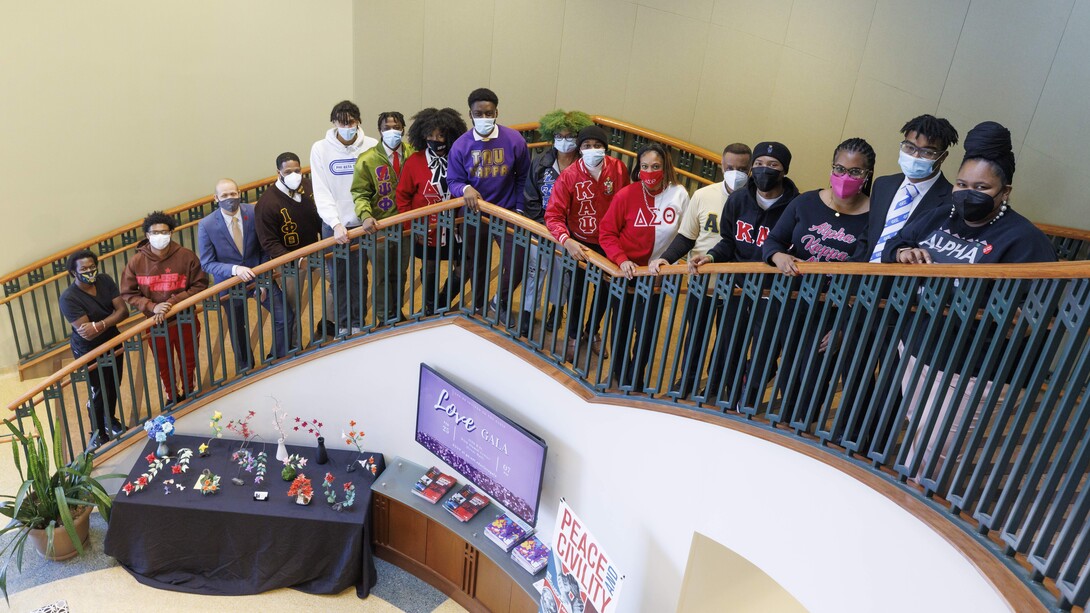
Within the University of Nebraska–Lincoln’s campus, some of society’s most influential fraternities and sororities thrive. Known as “The Divine Nine,” these organizations are dedicated to uplifting and encouraging Black men and women.
The Divine Nine — consisting of Alpha Phi Alpha, Alpha Kappa Alpha, Kappa Alpha Psi, Omega Psi Phi, Delta Sigma Theta, Phi Beta Sigma, Zeta Phi Beta, Sigma Gamma Rho and Iota Phi Theta — are known for hosting justice-driven and history-making men and women.
The university is home to five of these chartered organizations that fall under the National Pan-Hellenic Council: Delta Sigma Theta, Kappa Alpha Psi, Omega Psi Phi, Phi Beta Sigma and Zeta Phi Beta.
As one of the assistant directors to fraternity and sorority life at Nebraska, Quinna Hogan oversees NPHC chapters as well as organizations within the Multicultural Greek Council. Her ties to Greek life stretch back to the hallways of her middle school, where she remembers seeing her one of her teachers proudly display Alpha Kappa Alpha’s pink and green hues.
“She walked in our science class one day, and it was raining and she walked in with this big AKA umbrella…and I was like, ‘Man, what is that?’” Hogan said.
With her interest in AKA piqued, Hogan began to pick up more information on the college experience from her middle and high school teachers and advisers.
One teacher, who had attended one of the nation’s Historically Black Colleges and Universities, made a particular impression. But when Hogan finally started college, things felt different than she thought they would.
“I was one of four people in the department that looked like me,” Hogan said. “I was the only one that looked like me in our freshman class. My scope of what my college experience was going to look like changed very drastically.”
Hogan gravitated toward members of the AKA chapter at her campus. Though she couldn’t pledge the organization right away, she formed strong connections with the women involved and eventually joined during junior year.
With her experiences in Greek life as an undergraduate under her belt, Hogan now hopes to help students at Nebraska succeed in their own chapters.
Nebraska U’s National Pan-Hellenic Council Greek chapters date back as far as 1916, when Kappa Alpha Psi first formed an on-campus presence with their Eta chapter. Four years later, the Omicron chapter of Delta Sigma Theta started on campus. In Greek organizations, chapters take on a letter of the Greek alphabet signifying their spot in the national organization lineage. This would make Nebraska’s Kappa Alpha Psi the eighth chapter within the United States, and Delta Sigma Theta the 15th.
“When I first came to the university, I was elated that a PWI of UNL’s magnitude had single-letter organizations,” Hogan said. “Back where I’m from, I’m from the south, when you hear a single-letter organization, it means something. It’s a pretty big deal… And so to think UNL has two single-letter organizations on this campus — that is a phenomenal thing to have. But I don’t know that the culture is celebrated that way.”
Hogan is devoted to helping current National Pan-Hellenic Council students realize the magnitude and momentum of their organizations. She wants them be known for their knowledge, leadership and stewardship. When she walks across campus, she hopes to see them going to and from classes while wearing their letters with pride. She wants them to be recognized.
“The time is now,” Hogan said. “I think specifically… NPHC has been at UNL way, way too long for them not to have the recognition that they deserve.”
Historical impact
National Pan-Hellenic Council fraternity and sorority members can vouch for both the impact and the importance of their organizations.
Marlenia Thornton, a Master of Business Administration student and member of Delta Sigma Theta, knew upon joining that her membership would be a lifetime commitment. As a first-generation student, she leaned on her sorority sisters to find a campus community, and now as a graduate student, she can reflect on her post-graduate academic ventures with other Delta women that have pursued advanced degrees.
There’s also the historical connection that comes from National Pan-Hellenic Council organizations — the legacies of men and women who share the same connection with college students today, who lived through segregation, societal alienation, the civil rights movement and more all while wearing the same Greek alphabet letters.
“When it comes to like Divine Greeks and American history … we are an integral part of that. A lot of my sorority sisters were there for very historical moments, like the suffrage movement and civil rights,” Thornton said. “I think that while these organizations are created because we were excluded from other organizations and there wasn’t that community there for us, that there’s been so much progress on the behalf of these organizations that I think people don’t realize.”
Positive progress on behalf of a National Pan-Hellenic Council organization has been shown in Lincoln, where Alpha Kappa Psi Eta member Clyde Malone founded the Clyde Malone Community Center, which provides community enrichment while also promoting African American history.
Positive progress on behalf of the organizations has also stretched into 2021, when Alpha Kappa Alpha member Kamala Harris was named the first woman, African American and Asian American official elected to the vice presidency. For AKA member and assistant professor Monique Farmer, calling such an influential figure her soror (Latin for “sister”) is exactly why the organization was formed.
“It feels heartwarming. It feels like what the intent of the sorority was,” Farmer said. “You don’t need to ask permission to shine your light bright or be great or break glass ceilings. You need to show up as the AKA woman that you’ve been given an opportunity to be in these leadership roles that the sorority positions you for and mentors you in.”







